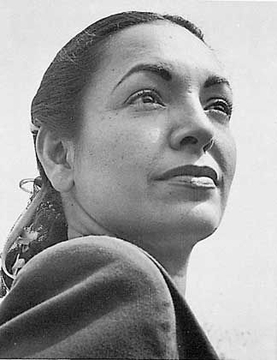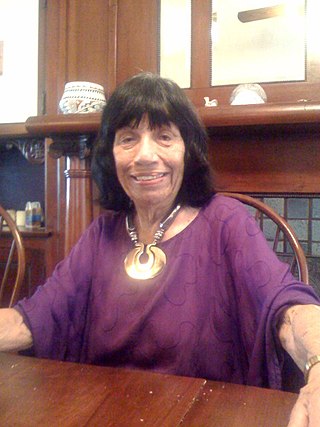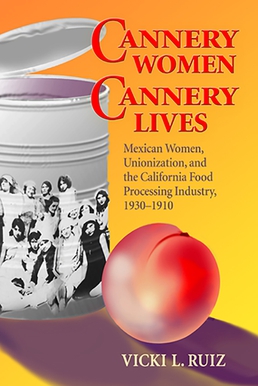Related Research Articles

Josefina Fierro, later Josefina Fierro de Bright, was a Mexican-American leader who helped organize resistance against discrimination in the American Southwest during the Great Depression. She was the daughter of immigrants who had fled revolution in Mexico to settle in California. She grew up in Los Angeles and the San Joaquin Valley.

Norma Elia Cantú is a Chicana postmodernist writer and the Murchison Professor in the Humanities at Trinity University in San Antonio, Texas.

Chicana feminism is a sociopolitical movement, theory, and praxis that scrutinizes the historical, cultural, spiritual, educational, and economic intersections impacting Chicanas and the Chicana/o community in the United States. Chicana feminism empowers women to challenge institutionalized social norms and regards anyone a feminist who fights for the end of women's oppression in the community.

Yolanda Margarita López was an American painter, printmaker, educator, and film producer. She was known for her Chicana feminist works focusing on the experiences of Mexican-American women, often challenging the ethnic stereotypes associated with them. Lopez was recognized for her series of paintings which re-imagined the image of the Virgen de Guadalupe. Her work is held in several public collections including the Smithsonian American Art Museum, the San Francisco Museum of Modern Art, and the Los Angeles County Museum of Art.
Luisa Moreno was a leader in the United States labor movement and a social activist. She unionized workers, led strikes, wrote pamphlets in English and Spanish, and convened the 1939 Congreso de Pueblos de Habla Española, the "first national Latino civil rights assembly", before returning to Guatemala in 1950.

Chicano poetry is a subgenre of Chicano literature that stems from the cultural consciousness developed in the Chicano Movement. Chicano poetry has its roots in the reclamation of Chicana/o as an identity of empowerment rather than denigration. As a literary field, Chicano poetry emerged in the 1960s and formed its own independent literary current and voice.
Cecilia Alvarez is an American Chicana artist known for her oil paintings and murals depicting themes of feminism, poverty, and environmental degradation in the United States and Latin America. Alvarez's painting Las Cuatas Diego has been featured in books and exhibitions around the world. Alvarez has also illustrated the bilingual children's book Antonio's Card authored by Rigoberto González. Her work is collected by the Mexican Fine Arts Museum, the Seattle Art Museum and by the Kaiser Foundation.

Elizabeth "Betita" Martínez was an American Chicana feminist and a long-time community organizer, activist, author, and educator. She wrote numerous books and articles on different topics relating to social movements in the Americas. Her best-known work is the bilingual 500 years of Chicano History in Pictures, which later formed the basis for the educational video ¡Viva la Causa! 500 Years of Chicano History. Her work was hailed by Angela Y. Davis as comprising "one of the most important living histories of progressive activism in the contemporary era ... [Martínez is] inimitable ... irrepressible ... indefatigable."
Mexican American literature is literature written by Mexican Americans in the United States. Although its origins can be traced back to the sixteenth century, the bulk of Mexican American literature dates from post-1848 and the United States annexation of large parts of Mexico in the wake of the Mexican–American War. Today, as a part of American literature in general, this genre includes a vibrant and diverse set of narratives, prompting critics to describe it as providing "a new awareness of the historical and cultural independence of both northern and southern American hemispheres". Chicano literature is an aspect of Mexican American literature.
Laura Aguilar was an American photographer. She was born with auditory dyslexia and attributed her start in photography to her brother, who showed her how to develop in dark rooms. She was mostly self-taught, although she took some photography courses at East Los Angeles College, where her second solo exhibition, Laura Aguilar: Show and Tell, was held. Aguilar used visual art to bring forth marginalized identities, especially within the LA Queer scene and Latinx communities. Before the term Intersectionality was used commonly, Aguilar captured the largely invisible identities of large bodied, queer, working-class, brown people in the form of portraits. Often using her naked body as a subject, she used photography to empower herself and her inner struggles to reclaim her own identity as “Laura”- a lesbian, fat, disabled, and brown person. Although work on Chicana/os is limited, Aguilar has become an essential figure in Chicano art history and is often regarded as an early "pioneer of intersectional feminism” for her outright and uncensored work. Some of her most well-known works are Three Eagles Flying, The Plush Pony Series, and Nature Self Portraits. Aguilar has been noted for her collaboration with cultural scholars such as Yvonne Yarbo-Berjano and receiving inspiration from other artists like Judy Dater. She was well-known for her portraits, mostly of herself, and also focused upon people in marginalized communities, including LGBT and Latino subjects, self-love, and social stigma of obesity.
Anna Nieto-Gomez is a scholar, journalist, and author who was a central part of the early Chicana movement. She founded the feminist journal, Encuentro Femenil, in which she and other Chicana writers addressed issues affecting the Latina community, such as childcare, reproductive rights, and the feminization of poverty.
This is a Mexican American bibliography. This list consists of books, and journal articles, about Mexican Americans, Chicanos, and their history and culture. The list includes works of literature whose subject matter is significantly about Mexican Americans and the Chicano/a experience. This list does not include works by Mexican American writers which do not address the topic, such as science texts by Mexican American writers.
Jessica Millward is an American historian who focuses on African American history, early America, African diaspora, slavery, and gender. Her work focuses on the female slave experience by emphasizing narratives of black women during slavery.
Hijas de Cuauhtémoc was a student Chicana feminist newspaper founded in 1971 by Anna Nieto-Gómez and Adelaida Castillo while both were students at California State University, Long Beach.
Felicitas Córdova Apodaca was an American women's and children's advocate and community activist. She became involved with the Community Service Organization (CSO) in El Monte, California.
Patricia Zavella is an anthropologist and professor at the University of California, Santa Cruz in the Latin American and Latino Studies department. She has spent a career advancing Latina and Chicana feminism through her scholarship, teaching, and activism. She was president of the Association of Latina and Latino Anthropologists and has served on the executive board of the American Anthropological Association. In 2016, Zavella received the American Anthropological Association's award from the Committee on Gender Equity in Anthropology to recognize her career studying gender discrimination. The awards committee said Zavella’s career accomplishments advancing the status of women, and especially Latina and Chicana women have been exceptional. She has made critical contributions to understanding how gender, race, nation, and class intersect in specific contexts through her scholarship, teaching, advocacy, and mentorship. Zavella’s research focuses on migration, gender and health in Latina/o communities, Latino families in transition, feminist studies, and ethnographic research methods. She has worked on many collaborative projects, including an ongoing partnership with Xóchitl Castañeda where she wrote four articles some were in English and others in Spanish. The Society for the Anthropology of North America awarded Zavella the Distinguished Career Achievement in the Critical Study of North America Award in the year 2010. She has published many books including, most recently, "I'm Neither Here Nor There, Mexicans"Quotidian Struggles with Migration and Poverty, which focuses on working class Mexican Americans struggle for agency and identity in Santa Cruz County.

Cynthia Ann Orozco is a professor of history and humanities at Eastern New Mexico University known for her work establishing the field of Chicana studies.

Cannery Women, Cannery Lives: Mexican Women, Unionization, and the California Food Processing Industry, 1930-1950 is a 1987 monograph by Vicki L. Ruiz published by the University of New Mexico Press.
Deborah Mora Espinosa is a Chicana activist in Colorado. She worked for History Colorado as the director of El Pueblo History Museum.
Albert Michael Camarillo is an American historian, author and academic. He is the Leon Sloss Jr. Memorial Professor Emeritus in the Department of History at Stanford University, and holds a courtesy appointment as a professor in the Graduate School of Education.
References
- 1 2 3 "Vicki L. Ruiz Biography | AHA". www.historians.org. Retrieved 2018-09-18.
- ↑ Chan, Alex (2015-09-06). "UCI professor to receive honor from Obama". Daily Pilot. Retrieved 2021-03-03.
{{cite web}}: CS1 maint: url-status (link) - ↑ "UC Irvine Professor Vicki Ruiz Pioneered the Study of Mexican-American Women—and Isn't Done". 2017-03-15.
- 1 2 3 4 5 Matsumoto, Valerie J. "Vicki L. Ruiz Biography". American Historical Association. Retrieved 2 March 2017.
- 1 2 Arora, Anupama; et al. (Fall 2016). "A History of Their Own: A Conversation with Vicki L. Ruiz" (PDF). Journal of Feminist Scholarship. 11: 6–15.
- ↑ Jamie., Martinez Wood (2007). Latino writers and journalists. New York: Facts On File. ISBN 978-1-4381-0785-1. OCLC 234078339.
- ↑ "Scholar - Women Also Know History". Women Also Know History. Retrieved 2018-09-18.
- ↑ Meyer, Leisa (2008). "Ongoing Missionary Labor: Building, Maintaining, and Expanding Chicana Studies/History". Feminist Studies. 34 (1–2): 23–45.
- 1 2 3 Latinas! : women of achievement. Telgen, Diane., Kamp, Jim. Detroit: Visible Ink Press. 1996. ISBN 978-0-7876-0883-5. OCLC 34514552.
{{cite book}}: CS1 maint: others (link) - 1 2 "Borderlands History Interview Project Presents Dr. Vicki L. Ruiz". Borderlands History. 6 March 2015. Retrieved 2 March 2017.
- ↑ "Vicki Ruiz named scholar-in-residence at Occidental's Institute for the Study of L.A. | School of Social Sciences | UCI Social Sciences". www.socsci.uci.edu. Retrieved 2018-09-18.
- ↑ "Vicki L. Ruiz". The OAH Distinguished Lectureship Program. Organization of American Historians. Retrieved 2 March 2017.
- ↑ "President Obama Awards 2014 National Humanities Medal". National Endowment for the Humanities. 2015-09-02. Retrieved 2018-02-16.